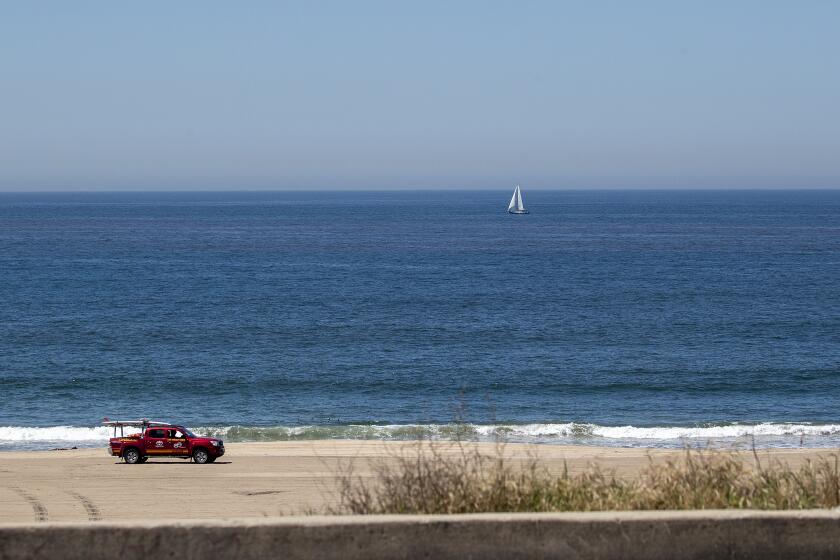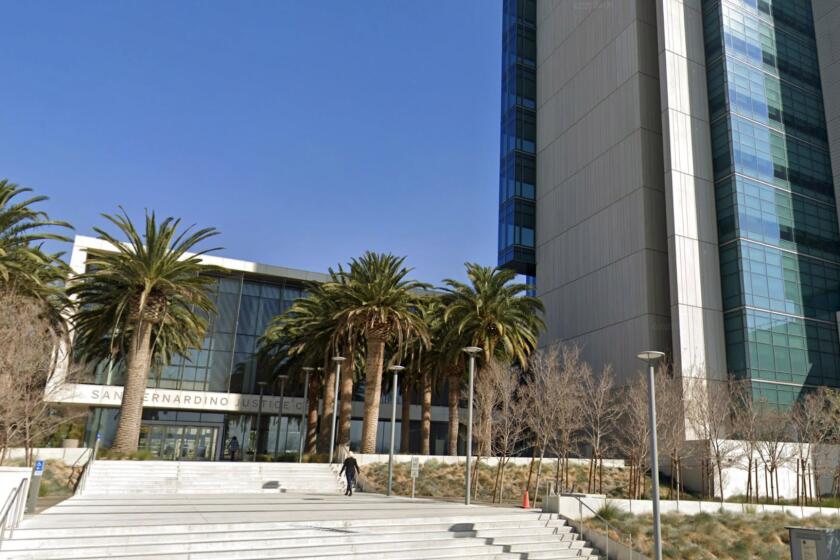Incinerator Plan Suffers Setback in Court Ruling
Opponents of a proposed waste-to-energy plant in Irwindale won a major victory Tuesday when a Los Angeles Superior Court judge rejected an attempt to override a state Energy Commission decision requiring the company to line up trash contracts before the plant is built.
Attorney Richard Richards, representing the developer, Pacific Waste Management Corp., conceded that the ruling by Judge Warren Deering is a setback, but said that the project is still alive.
“It has not been sidetracked and it has not been killed,” he said.
Richards said he will confer with company officials before deciding on the next move.
Dec. 1 Deadline
The court action leaves Pacific Waste still facing a Dec. 1 deadline to line up contracts for 75% of the trash needed to fuel its proposed plant or risk termination of its construction application before the Energy Commission.
So far, the company has been unable to obtain commitments for any of the thousands of tons of trash the plant would burn daily to generate electricity. The company says it is impractical to negotiate contracts with waste haulers now when it is not certain that the plant will be built.
Richards told the court that the project “is going to go down the drain if it cannot get itself straightened out on this issue.”
If the company does not meet the trash supply requirement by Dec. 1, the Energy Commission will consider issuing an order for Pacific Waste to show cause why licensing proceedings should not be terminated.
Lawrence Peck, Pacific Waste president, said in a declaration filed with the court that “the climate of uncertainty and the loss of shareholder confidence, already prevalent, will assume lethal proportions if order-to-show-cause proceedings are commenced.”
Pacific Waste filed a petition in Superior Court on Oct. 30 asking for a writ to overturn the waste-supply requirement on grounds that the Energy Commission had no authority to impose the condition and that commission Chairman Charles Imbrecht judged the waste-supply issue before hearing Pacific Waste’s case.
The charge against Imbrecht was based on a letter he wrote May 5 to a state senator opposing a bill that would have relaxed trash-contract requirements for waste-to-energy projects. The letter was written before the commission vote in September, denying Pacific Waste’s appeal for relief from a waste-commitment order.
Pacific Waste had asked Imbrecht to abstain on the appeal vote, but he refused on the advice of the Energy Commission’s attorney.
Alan B. Lilly, deputy attorney general representing the Energy Commission, told Judge Deering that the commission must know the source of the trash as part of its environmental analysis of the project.
Impact of Traffic
For example, he said, there would be hundreds of garbage trucks carrying trash to the plant and the commission needs to know where the trucks would come from to analyze the traffic impact.
However, Lilly said that the commission’s action on the trash-contract issue is not yet final and that the court should not consider the matter until the commission proceedings are concluded.
“There is no indication that the commission has made a final decision,” Lilly said at the hearing.
Even if the commission calls a hearing to consider terminating the licensing proceedings, he said, Pacific Waste still would have a chance to persuade the commission to change the waste-supply requirement.
‘By No Means Futile’
“It is by no means futile for Pacific Waste to pursue this matter further,” he said.
But Richards argued that it is a foregone conclusion that the Energy Commission will terminate the proceedings if the waste commitments are not produced.
“It is specious to say that they (energy commissioners) have not made a determination,” he said.
Judge Deering said it is judicial policy to allow administrative proceedings to run their course before courts enter a case.
After ruling in favor of the state, Deering kept the matter open by giving Richards a week to amend Pacific Waste’s petition to raise new arguments.
Attorney Terry O. Kelly, who has represented Miller Brewing Co. in its fight against the proposed plant, called the decision a significant victory for opponents of the Pacific Waste project.
Kelly filed papers in court charging Pacific Waste with seeking to escape enforcement of the waste-supply requirement in order to keep the Irwindale trash-to-energy project alive and thereby to “artificially inflate the price of the stock of Pacific Waste’s parent, Conversion Industries.”
Kelly submitted documents that indicated that officers and directors of the company, who held 43% of the common stock in April 1985, had reduced their holdings to 30% a year later.
‘Reducing Holdings’
He said, “It appears that the officers and directors of Conversion have been rapidly reducing their holdings in the company, and that to the extent the issuance of a stay (of the waste-supply requirement) by this court would assist in the completion of such disposal by keeping the stock price artificially high and causing uninformed investors to purchase such stock, it would not appear to be in the public interest to issue such an order.”
Steven Broiles, attorney for Pacific Waste, called Kelly’s allegations “scurrilous” and said there is no basis for the suggestion that investors are being misled.
He said information about licensing proceedings on the Irwindale project is reported regularly to the federal Securities & Exchange Commission so investors can be informed.
The proposed Irwindale plant is being financed through $395 million in tax-exempt bonds sold by an agency of the city of Irwindale for Pacific Waste.
Payments From Interest
Though the bond money itself cannot be spent until Pacific Waste obtains a construction permit from the Energy Commission, reinvestment of the bond proceeds has provided millions of dollars to pay for legal expenses, environmental and engineering studies and other costs connected with the licensing effort.
The court decision is the latest in a series of setbacks for the waste-to-energy project.
Last week, the South Coast Air Quality Management District released preliminary findings that indicate that Pacific Waste has not obtained enough air pollution offset credits to build the plant. Pacific Waste must offset certain pollutants by acquiring credits that were created by reducing pollutants emitted elsewhere.
Last week, the commission staff also recommended against allowing Pacific Waste to amend its permit application to build its proposed incineration plant in two stages, starting with an initial capacity of 2,250 tons of trash a day.
The staff said Pacific Waste should either stick with its original proposal for a plant to handle 3,000 tons of trash a day, or file a new application, starting anew a licensing process that already has been under way for two years.
The two Energy Commission members who constitute the committee hearing the Irwindale application are expected to make a decision on this issue within a week.
More to Read
Start your day right
Sign up for Essential California for news, features and recommendations from the L.A. Times and beyond in your inbox six days a week.
You may occasionally receive promotional content from the Los Angeles Times.






